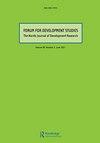财富的无限机会?巫术作为平等与经济赋权的策略
IF 1.1
Q3 DEVELOPMENT STUDIES
引用次数: 1
摘要
摘要巫术信仰和实践在非洲的持续存在与早期的学术研究相矛盾,早期的学术工作认为它会消失。此外,在人类学中,将巫术理论化为一种只存在于亲密关系中的人之间的地方话语也长期受到挑战。这一系列学术试图在当地和全球的关系中理解巫术,为巫术研究指明了一个新的方向。与人类学中最初的其他主题不同,巫术仍然是一个“热门话题”,并被一些学者称为“长期对话”。这篇文章介绍了个人如何利用巫术作为财富获取和保护的策略,并讲述了个人在面对社区时所面临的挑战。这一点通过民族志的描述得到了进一步的证明,该描述描述了如何对在新自由主义社会经济模式中追求成功的个人使用巫术策略。本文章由计算机程序翻译,如有差异,请以英文原文为准。
Limitless Opportunities for Wealth? Witchcraft as a Strategy for (In)Equality and Economic (Dis) Empowerment
Abstract The persistence of witchcraft beliefs and practices in Africa contradicts earlier scholarly work that suggested it would disappear. In addition, theorising witchcraft as a local discourse that only exists between people in an intimate relationship in anthropology has also long been challenged. This strand of scholarship has sought to understand witchcraft within the local-global nexus pointing to a new direction in witchcraft studies. Unlike other themes in anthropology that began the discipline, witchcraft continues to be a ‘hot currency’ topic and has been termed by some scholars as the ‘long conversation’. This article presents a current ethnographic account of how witchcraft is utilised by individuals as a strategy for wealth gain and protection and serves as narrative for the challenges individuals are experiencing when having to navigate between often incompatible expectations placed on the individual vis-a-vis the community. This is further exemplified through the ethnographic account on how witchcraft strategies are employed against individuals who are pursuing success in neoliberal socio-economic model.
求助全文
通过发布文献求助,成功后即可免费获取论文全文。
去求助
来源期刊

FORUM FOR DEVELOPMENT STUDIES
DEVELOPMENT STUDIES-
CiteScore
1.80
自引率
14.30%
发文量
24
期刊介绍:
Forum for Development Studies was established in 1974, and soon became the leading Norwegian journal for development research. While this position has been consolidated, Forum has gradually become an international journal, with its main constituency in the Nordic countries. The journal is owned by the Norwegian Institute of International Affairs (NUPI) and the Norwegian Association for Development Research. Forum aims to be a platform for development research broadly defined – including the social sciences, economics, history and law. All articles are double-blind peer-reviewed. In order to maintain the journal as a meeting place for different disciplines, we encourage authors to communicate across disciplinary boundaries. Contributions that limit the use of exclusive terminology and frame the questions explored in ways that are accessible to the whole range of the Journal''s readership will be given priority.
 求助内容:
求助内容: 应助结果提醒方式:
应助结果提醒方式:


